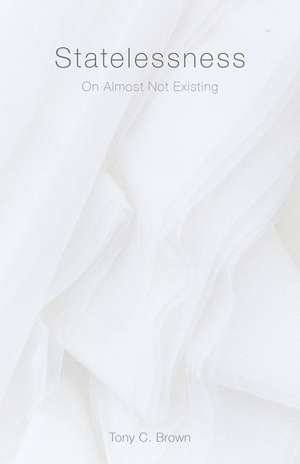Statelessness: On Almost Not Existing
Autor Tony C. Brownen Limba Engleză Paperback – 15 noi 2022
A pathbreaking new genealogy of statelessness
Just as the modern state and the citizenship associated with it are commonly thought of as a European invention, so too is citizenship’s negation in the form of twentieth-century diaspora and statelessness. Statelessness sets forth a new genealogy, suggesting that Europe first encountered mass statelessness neither inside its own borders nor during the twentieth century, as Hannah Arendt so influentially claimed, but outside of itself—in the New World, several hundred years earlier.
Through close readings of political philosophers from Hobbes to Rousseau to Kant, Tony C. Brown argues that statelessness became a central problem for political thought early on, with far-reaching implications for thinking both on the state and on being human. What Europeans thought they saw among the “savages” of the Americas was life without political order, life less than human. Lacking almost everything those deemed clearly human had achieved, the stateless existed in a radically precarious, almost inhuman privation.
And yet this existence also raised the unsettling possibility that state-based existence may not be inevitable, necessary, or even ideal. This possibility, as Brown shows, prompts the response—as defensive as it was aggressive—that we call Enlightenment political philosophy, which arguably still orders much thinking on being stateless today, including our discourses concerning migrants and Indigenous peoples.
Just as the modern state and the citizenship associated with it are commonly thought of as a European invention, so too is citizenship’s negation in the form of twentieth-century diaspora and statelessness. Statelessness sets forth a new genealogy, suggesting that Europe first encountered mass statelessness neither inside its own borders nor during the twentieth century, as Hannah Arendt so influentially claimed, but outside of itself—in the New World, several hundred years earlier.
Through close readings of political philosophers from Hobbes to Rousseau to Kant, Tony C. Brown argues that statelessness became a central problem for political thought early on, with far-reaching implications for thinking both on the state and on being human. What Europeans thought they saw among the “savages” of the Americas was life without political order, life less than human. Lacking almost everything those deemed clearly human had achieved, the stateless existed in a radically precarious, almost inhuman privation.
And yet this existence also raised the unsettling possibility that state-based existence may not be inevitable, necessary, or even ideal. This possibility, as Brown shows, prompts the response—as defensive as it was aggressive—that we call Enlightenment political philosophy, which arguably still orders much thinking on being stateless today, including our discourses concerning migrants and Indigenous peoples.
Preț: 164.03 lei
Nou
Puncte Express: 246
Preț estimativ în valută:
31.39€ • 32.77$ • 25.98£
31.39€ • 32.77$ • 25.98£
Carte disponibilă
Livrare economică 14-28 martie
Livrare express 27 februarie-05 martie pentru 28.69 lei
Preluare comenzi: 021 569.72.76
Specificații
ISBN-13: 9781517912420
ISBN-10: 1517912423
Pagini: 312
Dimensiuni: 140 x 216 x 23 mm
Greutate: 0.45 kg
Editura: University of Minnesota Press
Colecția Univ Of Minnesota Press
ISBN-10: 1517912423
Pagini: 312
Dimensiuni: 140 x 216 x 23 mm
Greutate: 0.45 kg
Editura: University of Minnesota Press
Colecția Univ Of Minnesota Press
Notă biografică
Tony C. Brown is associate professor of comparative literature at the University of Minnesota–Twin Cities. He is author of The Primitive, the Aesthetic, and the Savage: An Enlightenment Problematic.
Recenzii
"Magnificently learned, deeply rigorous, and exceptionally clear, this decisive, original work fundamentally and importantly reframes our understanding of statelessness as an operative political category."—Martin Crowley, University of Cambridge
"Statelessness addresses a truly vital issue, and Tony C. Brown's analysis works to 'denaturalize' the state as the only and inevitable form of human social organization."—James C. Scott, author of Against the Grain: A Deep History of the Earliest States
"Statelessness addresses a truly vital issue, and Tony C. Brown's analysis works to 'denaturalize' the state as the only and inevitable form of human social organization."—James C. Scott, author of Against the Grain: A Deep History of the Earliest States
